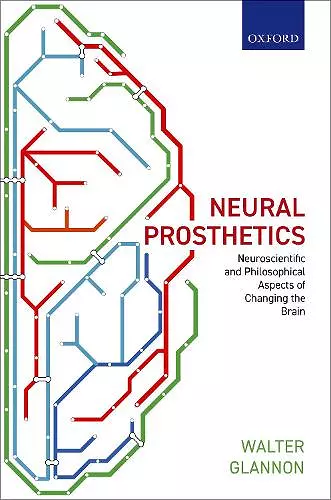Neural Prosthetics
Neuroscientific and Philosophical Aspects of Changing the Brain
Format:Hardback
Publisher:Oxford University Press
Published:31st Aug '21
Currently unavailable, and unfortunately no date known when it will be back

Neural prosthetics are systems or devices implanted in or connected to the brain that influence the input and output of information. They modulate, bypass, supplement, or replace regions of the brain and its connections to parts of the body that are damaged, dysfunctional, or lost, whether from congenital conditions, brain injury, limb loss, or neurodegenerative disease. Neural prosthetics can restore sensory, motor, and cognitive functions in people with these conditions and enable them to regain functional independence and improve their quality of life. This book explores the neuroscientific and philosophical implications of neural prosthetics. Neuroscientific discussion focuses on how neural prosthetics can restore brain and bodily functions to varying degrees, looking at auditory and visual prosthetics, deep brain and responsive neurostimulation, brain-computer interfaces, brain-to-brain interfaces, and memory prosthetics. Philosophical discussion then considers the degree to which people with these prosthetics can benefit from or be harmed by them. Finally, it explores how these devices and systems can lead to a better understanding of the brain-mind relation, mental causation, and agency. This is an essential volume for anyone invested in the current and future directions of neural prosthetics, including neuroscientists, neurologists, neurosurgeons, neural engineers, psychologists, and psychiatrists, as well as philosophers, bioethicists, and legal theorists.
This text is required reading for those who wish to accomplish two goals: gain a comprehensive overview of BMI and related neuro-technologies and understand the empirical, conceptual, and normative issues that surround these technologies * H. Storl, Choice Connect *
Medicine is never more fraught than when it tinkers with brain and mind. In lucid, fascinating, and compelling prose Walter Glannon shows why implantable brain devices must refashion how we see autonomy, moral responsibility, and personal identity. Glannon's rare ability to translate cutting-edge science and his unique philosophical insight make this a definitive text on the ethics and metaphysics of neural prosthetics. * Paul Biegler, Monash Bioethics Centre, Monash University, Melbourne, Australia *
Glannon has provided a remarkably accessible, lucid, and comprehensive overview of ethical issues in neuroprosthetics. The book is a wide-ranging, timely, and balanced examination of the state of the field and of the kinds of questions with which we all need to begin to grapple. * Eran Klein, Center for Neurotechnology (CNT), Affiliate Assistant Professor, Department of Philosophy, University of Washington, USA *
Technologies that interact directly with the brain in service of a therapeutic aim, such as brain-computer interfaces for control of external devices and neural prosthetics for memory, offer the potential to alleviate suffering and enhance the autonomy of those who make use of them. However, these devices also bring with them serious ethical concerns and raise questions of philosophy of mind. This important monograph expertly synthesises a large body of scientific literature relating to neuroprosthetics, and in response, engages in rigorous and insightful philosophical reflection. The book is both excellent and timely, and can and should be drawn on by a wide range of readers including scholars of neuroscience, biomedical engineering, and medicine, as well philosophers and law academics. * Allan McCay, Deputy Director of the Institute of Criminology, University of Sydney, Australia *
This book provides a succinct but comprehensive introduction to all major neural prosthetics and their philosophical implications. It is informative, thought-provoking, and timely for an age when neural technologies are rapidly advancing while the conversations between scientists, clinicians, ethicists, and the general public are still lacking. * Dong Song, Research Associate Professor, Department of Biomedical Engineering, University of Southern California, USA *
ISBN: 9780198813910
Dimensions: 240mm x 160mm x 19mm
Weight: 584g
272 pages